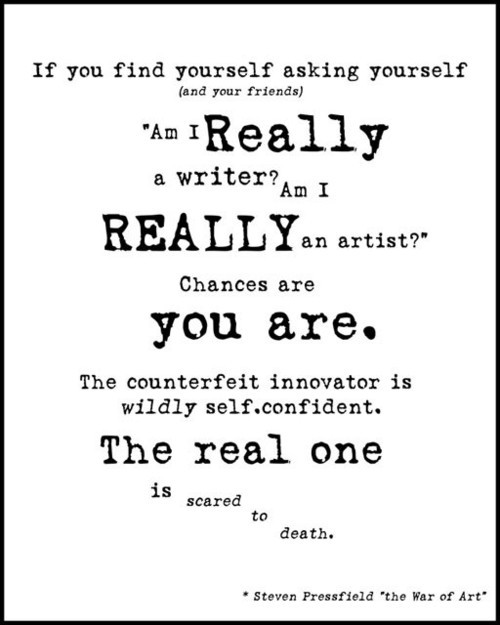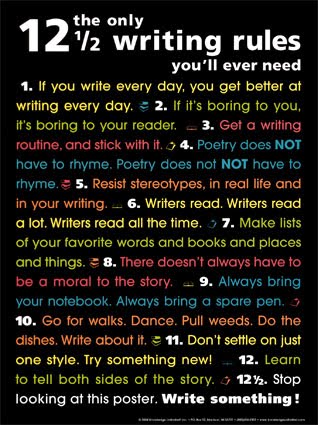I've discovered the perfect explanation to my avoidance of writing these past two years.
I have a very rare form of writers aversion. It is fatal upon contagion, and leaves the victim unable to stomach even a small look at anything they have written.
For example, you open up your thick notebook, covered in scrawling words, and for a horrible moment you think you might die just looking at the numberless flaws which pretty much make up everything on the page. Within three seconds of opening up that notebook it's closed again, and hastily being shoved back onto the shelf. For the rest of the day you try to ignore the notebook, which seductively calls to you with its alluring voice. You nearly seurcom to the urge to write but are kept at bay by the rather loud protesting voice of your inner mind. Why try to write, when it will turn out fouler then a three year old gallon of milk left in the garage? Your love for writing matters little when you can't even acquire the momentum you need to start.
For those of you who know me, you are probably already aware of my major aversion to writing. Though I may proclaim to love it, my unwillingness to actually write may convince you otherwise. You could even be part of the mighty few who have attempted to get me going again, trying to get the old Lyndsey, the one who cared little about the mistakes and flaws, to come back again.
Though the old Lyndsey could plop herself down at a computer and write for hours that's not who I'm trying to become. I need a new Lyndsey, who can clearly and eloquently convey her emotions onto the paper with accuracy. Who can maintain an interesting dialogue, and glide between topics with ease. I need a Lyndsey who's ideas are fresh, and exciting, or else a Lyndsey that can write in a way that makes it feel so.
My Writing Plan:
1. Write everyday! Writing consistently gives you practice, and-gasp, is one of the best ways to become a better writer. Have you wondered why your writing skills seem to decline during summer vacation? You don't have those handy writing assignments to keep you whacked into shape!Writing everyday doesn't mean you have to spend hours pouring over your desktop, attempting to practice your skills. Just make a prompt, and go with it. Write until you have finished what you want to say. (Poetry is also acceptable). Here is a website I found helpful in giving prompts: http://www.pw.org/writing-prompts-exercises.
2. Starting up random narratives in your mind. Describe the trees, the sky, your bedroom, in as much detail as you can. At first it will take effort but eventually the routine will become embedded in you and you may catch yourself narrating things without meaning to.
“Sometimes even returning to the favorite books doesn’t work. There’s no inspiration to be found in the pages of Hopscotch, Pale Fire, or My Loose Thread. Words just seem stifling. Reminders of what I can’t seem to do. That’s when I turn to my photography books, cracking open their oversized spines and staring at images that stare blankly back at me. Something happens the longer I look at the static ghostly fashion photographs of Deborah Turbeville, the shadow-swallowed teenagers of Bill Henson, the colorful coke bottles, shower tiles, and oven interiors of William Eggleston. Shards of narrative rise to the surface. Gestures begin to suggest movement and character. It’s a world awaiting syllables that haven’t already been soiled.”
—Jeff Jackson, author of Mira Corpora (Two Dollar Radio, 2013)
3. If your getting bored as you write a passage, chances are your reader will be just as bored when reading it. Add variety in your writing, make things happen instead of talking about things to happen.
4. Read, read, read, read, and read some more! I have heard many times that the best writers start off by reading everything they can set their eyes on. If it has words, they will find it! By reading you gain what little instruction you can on writing. You can be inspired, learn more about writing then you could from a teacher, recognize character development and different patterns which make a book good or bad book. Start to learn who you are through this, write reviews on the books you read. Writing reviews will help you to understand your thought process better, as well as train yourself to organize your ideas on paper in a coherent way.
5. There doesn't always have to be a moral of the story. The best books I have ever read often are in shades of grey, wrong and right so unclear you really have to search deep in yourself to find the answers.

7. Make sure you are somewhere where you can think! I know many people listen to music and such when they are writing, but for me It is to distracting. I can't really get into the writing when my mind is divided between the awesome lyrics of three days grace's newest song and the half finished paragraph in front of me.
8. Don't get frustrated with yourself, writing doesn't come to you in one blinding moment of talent. It takes a lot of time, and a lot of practice. Your first book will likely be like a rough diamond at first, still in need of polishing up. Your going to make mistakes, but don't stumble. Get back up and keep at it!


10. Learn more about grammar! Sentence structure, spelling, and such will be important during the editing process.
11. Enjoy yourself! Writing isn't just about creating a piece to be proud of, its about enjoying the process there. Let yourself have fun with these prompts and exercises, extend yourself, challenge yourself. Make things interesting!

Sometimes its harder to write when things aren't busy, then when they are. You have so much room, so much empty time. Its hard to get the motivation to put yourself up to it. For now I thought I would recount two of my biggest dreams of the moment. One, to become an actual writer that I can be proud of, and two, to attend Brigham Young University in Provo Utah. Where, hopefully, I can take a creative writing course from my favorite author on the planet.
Again, thanks for reading! If you have any other ideas you think would benefit my list, please comment with them below!

This is nice, Lyns. Especially since I'm a writer as well. And that little poster was right. Poetry does NOT have to rhyme!
ReplyDelete-Nadd ( http://welshteenrevo.blogspot.com/ )
Thanks Nadd! I agree, poetry shouldn't be about rhythm- It should be more about the freedom expression.
DeleteHope your doing well!